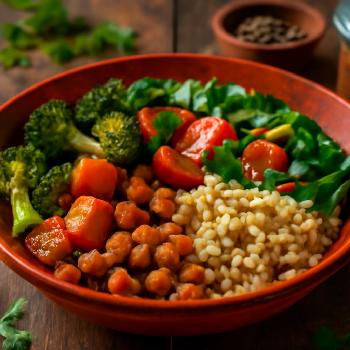Cooking Tips > Meal Planning > Dietary Considerations > What are good recipes for a vegan diet?
What are good recipes for a vegan diet?
Embarking on a vegan diet can be exciting and delicious! This tutorial provides a selection of beginner-friendly vegan recipes, covering breakfast, lunch, dinner, and snacks. Explore a variety of flavors and learn how to easily create satisfying plant-based meals. Discover recipes that are not only healthy and nutritious but also incredibly tasty and easy to prepare. This guide will help you navigate the world of vegan cooking and provide you with a foundation of go-to recipes.

Breakfast: Tofu Scramble
Ingredients: Firm or extra-firm tofu, crumbled (1 block), 1 tbsp olive oil, 1/2 onion, chopped, 1/2 bell pepper, chopped, 1/4 tsp turmeric (for color), Salt and pepper to taste, Optional: Nutritional yeast for cheesy flavor.
Instructions: Heat olive oil in a pan over medium heat. Add onion and bell pepper and cook until softened. Add crumbled tofu and turmeric. Season with salt and pepper. Cook, stirring occasionally, until tofu is heated through and slightly browned. Stir in nutritional yeast, if using. Serve with toast, avocado, or salsa.
Lunch: Lentil Soup
Ingredients: 1 cup brown or green lentils, 6 cups vegetable broth, 1 tbsp olive oil, 1 onion, chopped, 2 carrots, chopped, 2 celery stalks, chopped, 2 cloves garlic, minced, 1 tsp dried thyme, 1/2 tsp smoked paprika, Salt and pepper to taste.
Instructions: Rinse lentils. Heat olive oil in a large pot over medium heat. Add onion, carrots, and celery and cook until softened. Add garlic, thyme, and smoked paprika and cook for 1 minute more. Add lentils and vegetable broth. Bring to a boil, then reduce heat and simmer for 20-25 minutes, or until lentils are tender. Season with salt and pepper. Serve with crusty bread.
Dinner: Black Bean Burgers
Ingredients: 1 can (15 ounces) black beans, rinsed and drained, 1/2 cup cooked brown rice, 1/4 cup chopped onion, 1/4 cup chopped bell pepper, 1/4 cup breadcrumbs, 1 tbsp chili powder, 1 tsp cumin, Salt and pepper to taste.
Instructions: Mash black beans in a bowl. Add brown rice, onion, bell pepper, breadcrumbs, chili powder, and cumin. Season with salt and pepper. Mix well. Form into patties. Heat olive oil in a pan over medium heat. Cook patties for 5-7 minutes per side, or until heated through and slightly browned. Serve on buns with your favorite toppings (lettuce, tomato, avocado, salsa).
Snack: Hummus and Veggies
Ingredients: 1 can (15 ounces) chickpeas, rinsed and drained, 1/4 cup tahini, 2 tbsp lemon juice, 1 clove garlic, minced, 2 tbsp olive oil, Salt to taste, Assorted vegetables (carrots, celery, cucumbers, bell peppers).
Instructions: Combine chickpeas, tahini, lemon juice, garlic, olive oil, and salt in a food processor. Process until smooth and creamy, adding water as needed to reach desired consistency. Serve with assorted vegetables.
Important Considerations for Vegan Cooking
Vegan cooking focuses on plant-based ingredients. It excludes all animal products, including meat, dairy, eggs, and honey. Nutritional Adequacy: Ensure you're getting enough essential nutrients, such as vitamin B12 (often supplemented), iron, calcium, and omega-3 fatty acids. Consider incorporating fortified foods or supplements. Ingredient Substitutions: Learn to substitute animal products with plant-based alternatives. For example, flaxseed meal or chia seeds can be used as egg replacements in baking. Nutritional yeast adds a cheesy flavor to many dishes. Exploring Flavors: Don't be afraid to experiment with different herbs, spices, and cooking techniques to create flavorful and satisfying meals. Many cuisines offer naturally vegan dishes that can broaden your culinary horizons. Reading Labels: Always check ingredient labels carefully to ensure products are truly vegan, as some may contain hidden animal-derived ingredients. Look for certified vegan labels when available.
FAQ
-
Is a vegan diet healthy?
A well-planned vegan diet can be very healthy and provide all the necessary nutrients. It's important to focus on whole, unprocessed foods and ensure adequate intake of vitamin B12, iron, calcium, and omega-3 fatty acids. -
Where do vegans get their protein?
Vegans can obtain protein from a variety of sources, including lentils, beans, tofu, tempeh, nuts, seeds, and whole grains. -
What are some good sources of vitamin B12 for vegans?
Vitamin B12 is not naturally found in plant-based foods, so vegans typically need to supplement or consume fortified foods, such as fortified plant-based milks or breakfast cereals.
